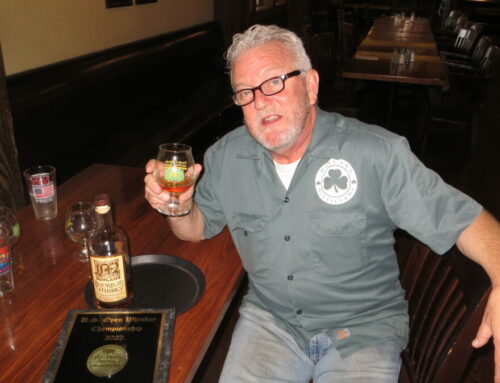‘WHAT DO YOU think of the (insert mass-produced wine name here)?” a man asked as he took a seat at the bar. The wine in question was the cheapest wine by the glass that we had. In fact, it was the absolute least-expensive option in the entire restaurant. It was so inexpensive that it actually cost less than most of our draft beers. Throw in the fact that it was also chardonnay — a varietal for which exceptional versions can run easily 10 to 20 times more — and the odds that it was going to be great were not high.
“It’s not bad for an inexpensive chardonnay,” I said, voicing what should have been fairly obvious.
“I can’t believe you said that!”
“Said what?”
“Now I don’t want it,” he said, ignoring my question. “I thought your job was to sell wine.”
It is always rewarding when someone decides to tell you what your job description is, especially when that someone has no idea what he is talking about.
“I don’t think your (insert mass-produced wine here) rep would appreciate what you just said about his wine,” he said.
Will Rogers is famous for saying, “I never met a man I didn’t like” — meaning, of course, that since he didn’t know the men, it was impossible for him to have an opinion about them beforehand. Not much is said about how he felt
after he met them, however.
Now the funny thing about wine is that there are quite a few things you can say about it that might, on the surface, sound unappealing, but to knowledgeable oenophiles are actually highly sought-after characteristics.
Here are a few:
•
Funky: Yep, funky. Sometimes wines exhibit an odor that is also characterized as barnyardy, or sweaty or even manurey. Now, one would think this would be a deal-breaker. However it is not, and in some incidences this flavor profile is desired. The funky flavor is often a result of the presence of brettanomyces yeast (or brett), a yeast that grows on grapes and in wineries, and in small amounts is known to add character to wines such as pinot noir. In fact, Oregon funk is a common descriptor for pinot noir from the Willamette Valley, some of which are quite expensive.
•
Flinty: Kramer on “Seinfeld” had a problem with a flinty voice in an episode from the TV show’s fifth season. When it comes to wine, “flinty” is one of those qualities also highly sought-after, particularly in French Chablis (a type of chardonnay) and sauvignon blanc. Characterized sometimes as steely or metallic, the French term is pierre à fusil, and is known to come from grapes grown in soils high in limestone.
•
Diesel fuel or petroleum: The wine must be bad, right? Not at all. With Riesling, especially aged Riesling, a distinctive petroleum quality is considered a plus. Beeswax, honeysuckle and petroleum — it all goes together to make Riesling one of great cépages nobles, or noble vines.
•
Cat pee: That’s right, cat pee. How can that be a desirable quality? Well, some sauvignon blanc, especially those from the Marlborough region in New Zealand (as well as some French and Hungarian examples) exude a quality that for lack of a better term is often described as cat pee. This aroma is the result of the high concentration of methoxypyrazines in the less-than-ripe grapes used in the production of sauvignon blanc south of the equator. Pyrazines tend to dissipate as the grapes ripen, but so do some of the other qualities so sought after in sauvignon blanc production. The trade-off is a not-so-appetizing name for a highly appetizing wine. Oddly, I’ve never seen the term listed in French, pipi de chat. Perhaps that is because it gains nothing in translation.
I did not share any of these qualities with the man who had taken great offense at “decent” and “inexpensive,” which led me to these thoughts:
• Sometimes a glass of wine is just a glass of wine, and sometimes it’s not.
• There are people who are paid to validate your choices — they are called therapists and charge about $100, give or take, an hour.
• The rep for that wine also represents other wines on our list. I’ve seen her drink those, but never the least-expensive one. I can’t imagine why.
• If you are buying a wine less expensive than most draft beer, decent is about as good as it is going to get.
• Adding an “h” to wine doesn’t change the pronunciation, just the meaning.
Jeff Burkhart is the author of “Twenty Years Behind Bars: The Spirited Adventures of a Real Bartender” as well as an award-winning bartender at a local restaurant. Follow him at www.jeffburkhart.net and contact him at jeffb@thebarflyonline.com


